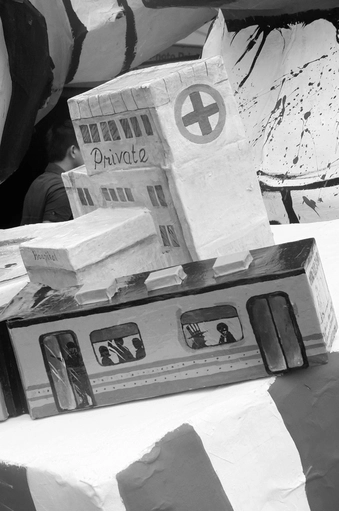Research & Publications
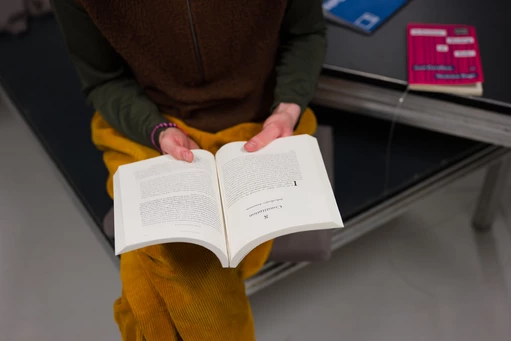
Usufructuaries of earth: a slow-growing reader
The “Usufructuaries of earth” focus on Prospections is a reader that undergirds the project as an usufructuary of knowledges, turning the research into a collective research and publishing resource.
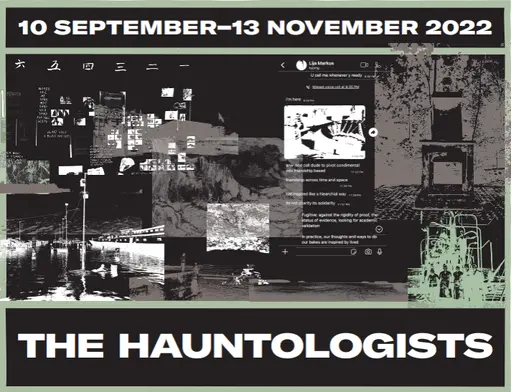
The Hauntologists
“The Hauntologists” is activated here as a Prospections focus—featuring both commissioned and archival material that has emerged out of the BAK Fellowship for Situated Practice 2021/2022 program.
Standing With Ukraine
BAK’s digital forum Prospections, provides—via its emergency focus “Standing With Ukraine.
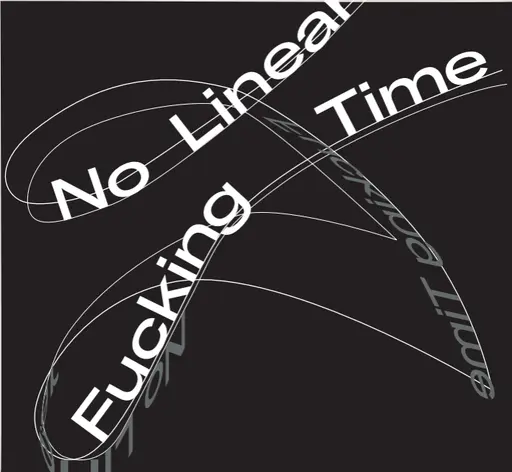
No Linear Fucking Time
This focus of Prospections engages a multitude of temporal registers through shifting scales and rhythms.

ExitStateCraft
In his 1860 study The Civilization of the Renaissance in Italy, historian Jacob Burckhardt noted that with the Italian city-states of the Renaissance, “a new fact appear[ed] in history: the state as the outcome of reflection and calculation, the state as a work of art.” 1 Writing during World War II, the philosopher Ernst Cassirer—familiar with Burckhardt—continued in a similar vein, arguing that circa 1500, with Macchiavelli, “the state [had] won its full autonomy . . . but at the same time it [was] completely isolated.
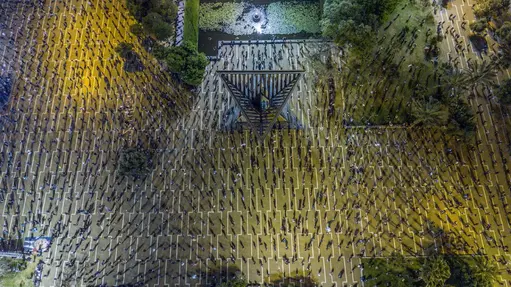
How to Assemble Now
We initiate this focus as the Netherlands, along with a significant part of the global community, begins to emerge from Covid-19 closures and as institutions are busy attempting to return to an awkwardly modulated version of “normal.” Yet the role of art and its institutions, as we understand it at BAK, basis voor actuele kunst is to continually envision and embody ways of being together otherwise.
Tactical Solidarities
“In the long run the practice of solidarity proves much more advantageous to the species than the development of individuals endowed with predatory inclinations.” Peter Kropotkin
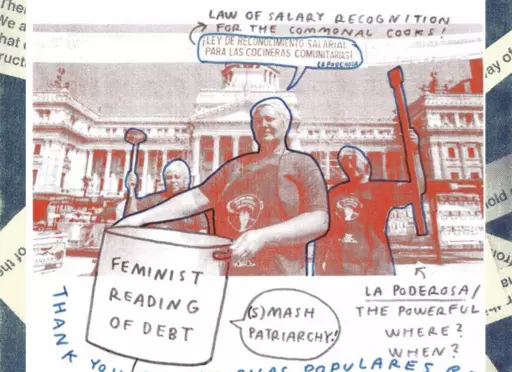
Held in the context of Usufructuaries of earth: chapter two, reading groups and publication, a reading group was convened by Iliada Charalambous and Philippa Driest on 28 April 2024 titled Undoing Debt, at KIOSK, Rotterdam. The reading group looked at debt as a form of gendered and financial violence and sought how to, in turn, “undo debt” through learning shared political tools and vocabulary inspired by transnational feminist movements.
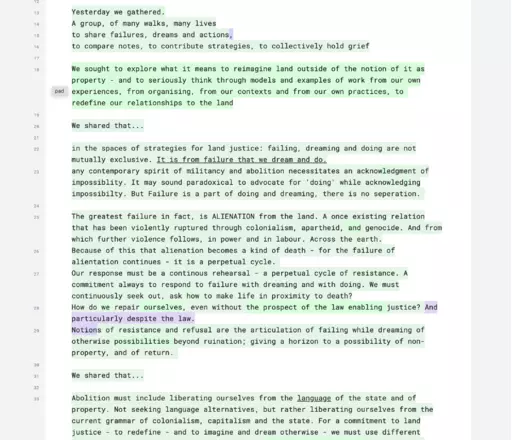
Convened by Johannesburg-based Yvonne Phyllis and MADEYOULOOK (Molemo Moiloa and Nare Mokgotho), the working session Failing, Dreaming, Doing: rehearsing abolition sought to conjure alternate imaginaries of life and labor with earth, beyond the regimes of colonial and racial enclosure. The following text was collectively written by the working session’s participants: Brenna Bhandar, Aya Bseiso, Layal Ftouni, Jennifer Irving, Tareq Khalaf, Gelare Khoshgozara, MADEYOULOOK (Molemo Moiloa and Nare Mokgotho), Marie Nour Hechaime, Yvonne Phyllis, Philip Rizk, Bobby Sayers, Shela Sheikh, and Kasia Wlaszczyk and was read out by Nare Mokgotho as part of “PROPOSITION 3 Failing, Dreaming, Doing: rehearsing abolition” during the Usufructuaries of earth convention public program, Saturday 25 May 2024 at BAK, basis voor actuele kunst, Utrecht.
________________________________________________________________________________
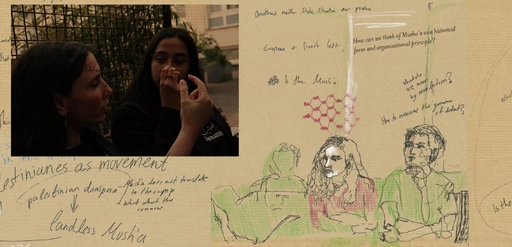
Held in the context of Usufructuaries of earth: Chapter two, reading groups and publication, a reading group spanning two days was convened by Joud Al-Tamimi and Lama El Khatib on 4 and 5 May 2024 titled And in your throats, a sliver of glass, a cactus thorn and On Value-Disrupting Activity, at bookstore خان الجنوب khan Aljanub, Berlin and Hopscotch Reading Room, Berlin respectively. Mokia Laisin put together a collaborative collage of annotations made during both days of the reading group discussions with input from Miriam Gatt on 4 May 2024.
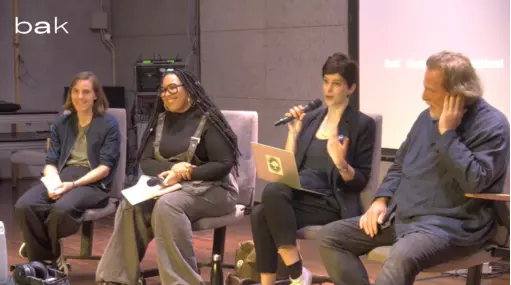
Held as part of day two of Usufructuaries of earth, chapter three, convention, on 25 May 2024, this video documents a closing conversation between Yvonne Phyllis, Denise Ferreira da Silva (online), Verónica Gago, Stefano Harney, Lena Wilderbach, and Brenna Bhandar (online), moderated by Shela Sheikh.
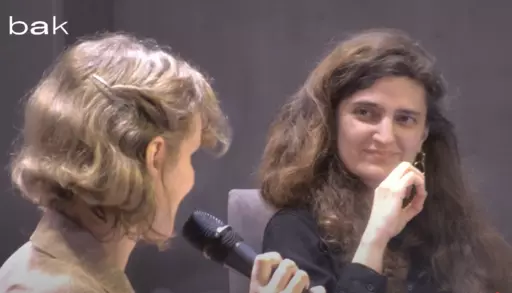
Held as part of day one of Usufructuaries of earth, chapter three, convention, on 24 May 2024, this video documents the words of welcome by Maria Hlavajova, followed by a conversation between Marwa Arsanios and Wietske Maas—as means of introduction to the Usufructuaries of earth public program.
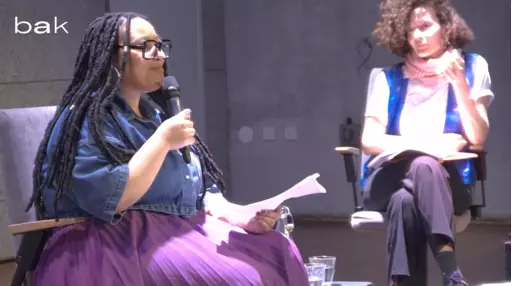
Held as part of day one of Usufructuaries of earth, chapter three, convention, on 24 May 2024, this video documents a conversation between Brenna Bhandar, Yvonne Phyllis, and Ruth Wilson Gilmore(online), moderated by Layal Ftouni.
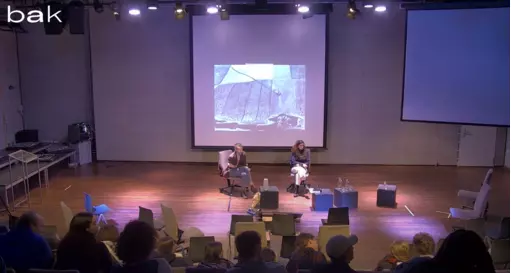
Held as part of day one of Usufructuaries of earth, chapter three, convention, on 24 May 2024, this video documents a conversation between conversation between Philip Rizk and Marwa Arsanios following a screening of Rizk’s film Mapping Lessons (2020).
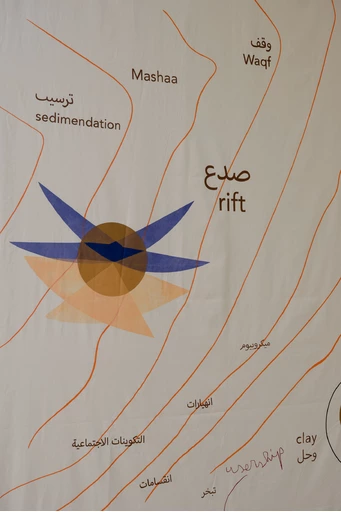
This essay, “Enclosures from Below: The Mushaa’ in Contemporary Palestine,” from geographer and researcher Noura Alkhalili is shared as part of the project Usufructuaries of earth, co-convened by BAK with artist Marwa Arsanios. It is one of the readings for the Amman reading group convened by artist-led research group Bahaleen involving locally-invited artists and researchers.
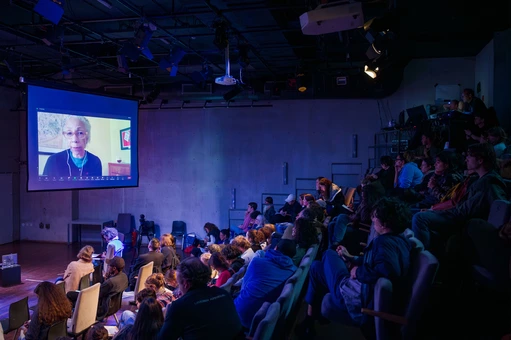
This chapter, “Scholar-Activists in the Mix,” from Ruth Wilson Gilmore's Abolition Geography: Essays Towards Liberation (2022) is shared as part of the project Usufructuaries of earth, co-convened by BAK with artist Marwa Arsanios. It is one of the readings for the Amman reading group convened by artist-led research group Bahaleen involving locally-invited artists and researchers.
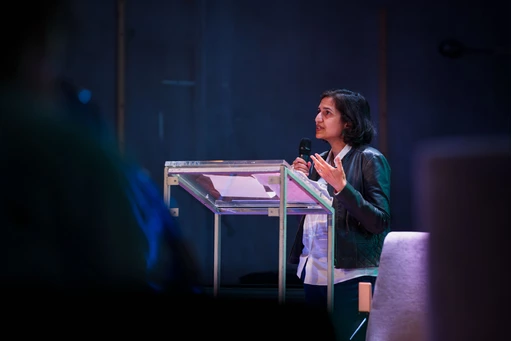
This chapter, “Improvement,” from legal scholar Brenna Bhandar’s Colonial Lives of Property: Law, Land, and Racial Regimes of Ownership (2018) is one of the readings for the Amman reading group.
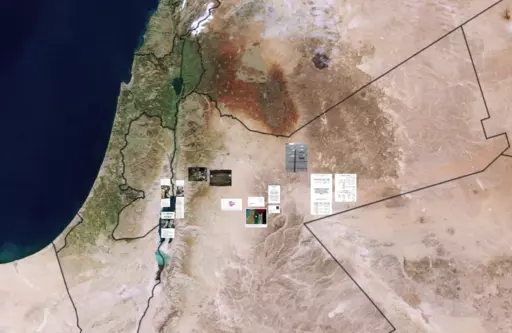
In the context of Usufructuaries of earth: Chapter two, reading groups and publication, a multi-day roaming reading residency, convened by the artist-led research group Bahaleen is held from May 9–13 2024, along the hilltops of Jerash and the edges of Palestine—an hour’s drive from Amman. Invited artists and researchers join Bahaleen in traveling by car and on foot, navigating notions of access and return. Together they grapple with the possibilities of disruption and dissent, aiming to articulate a liberatory vision of the commons from within this geopolitical conjuncture. During the reading residency a board of images and sources were assembled as a harvesting. The images are shared below as screengrabs from this image board, with accompanying links where appropriate.
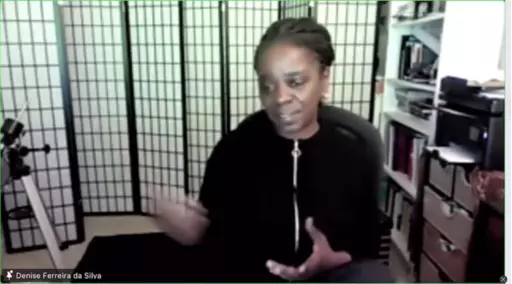
Originally published in Otherwise Worlds: Against Settler Colonialism and Anti-Blackness (Duke University Press, 2020), this essay, "Reading the Dead: A Black Feminist Poethical Reading of Global Capital" by academic, philosopher, and artist Denise Ferreira da Silva is shared here in the context of the project Usufructuaries of earth, co-convened by BAK with artist Marwa Arsanios. This chapter is one of the readings for the Berlin reading group convened by Joud Al-Tamimi and Lama El-Khatib, titled “On Value-Disrupting Activity,” at Hopscotch reading room, 5 May 2024. This reading group explores the political and theoretical stakes of value as it links to violences enacted on and through land and property in Palestine and elsewhere.
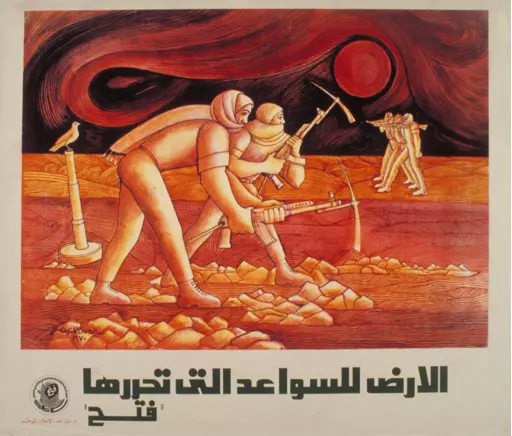
“What is a revolution that neither overthrows a state order nor institutes a lasting one of its own?” This is the question that teacher, author, and political theorist Nasser Abourahme poses in “Revolution after Revolution: The Commune as Line of Flight in Palestinian Anticolonialism.”
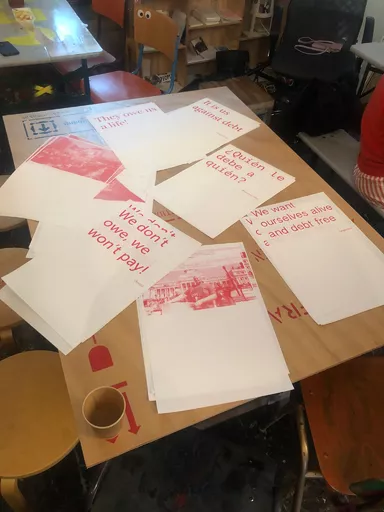
Three excerpts are republished here from researchers and activists Verónica Gago and Lucí Cavallero’s A Feminist Reading of Debt (London: Pluto Press, 2021). The text opens with a simple concept: that contemporary debt cannot be understood by only looking at “public debt,” and must instead look at the indebtedness present in everyday life. The authors call for debt to be adopted by social movements as a key issue, and furthermore, for people to be cognizant of the links between debt and sexist violence.
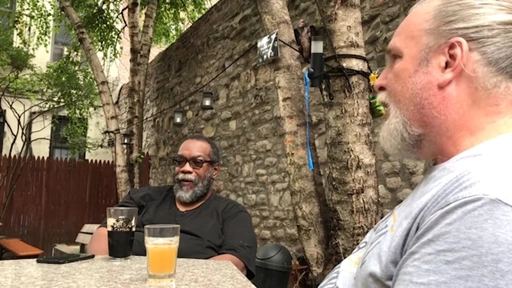
This is an extract from the chapter “Debt and Study,” in Stefano Harney and Fred Moten’s The Undercommons: Fugitive Planning & Black Study (2013). Across its three sections—Debt and Credit, Debt and Forgetting, and Debt and Refuge—this extract traces the sites and practices of “desired” and undesired debt that perforate contemporary financial capitalism and western culture. The text moves through different people who are marked as debt carriers, such as the precariat, the student, and racialized people, among others.
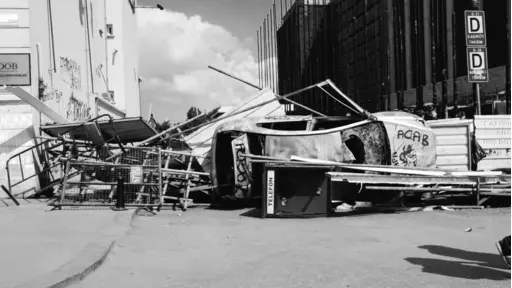
“Riot Now: Square, Street, Commune” is a chapter from political theorist Joshua Clover’s Riot. Strike. Riot: The New Era of Uprisings (Verso, 2016). Taking the classical Greek agora—a place of assembly and commerce—as a starting point, Clover suggests that it is perhaps no coincidence that many of the riots and occupations that emerged in recent decades either happened or began in modern squares. He speaks of how this emergence of rioters corresponded to “an underlying political-economic unity, a material reorganization of society, which provide[d] them a shared set of problems and a shared arena in which to confront them.”
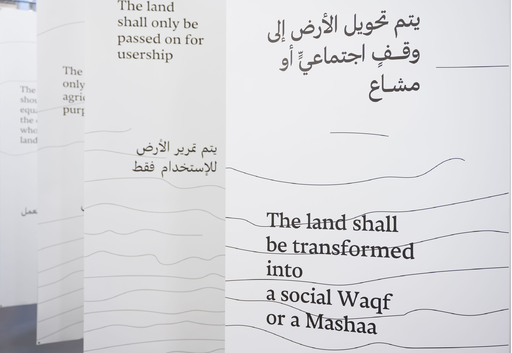
Charting the interconnectedness of capitalism, colonialism, and nationalism, Peter Linebaugh’s “Palestine & the Commons: Or, Marx & the Musha’a” speaks of “the violence of mapping, titling, buying, and selling which cast people into cities and camps following their expropriation from the land.”
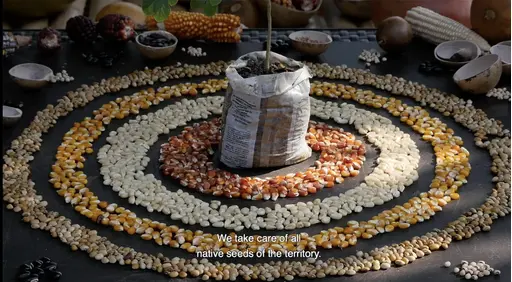
Originally published in Kohl Journal, this interview is between Samanta Arango Orozco, a member of Grupo Semillas, and the artist Marwa Arsanios, who is co-convening with BAK the multi-chaptered project Usufructuaries of earth until 2 June, 2024.
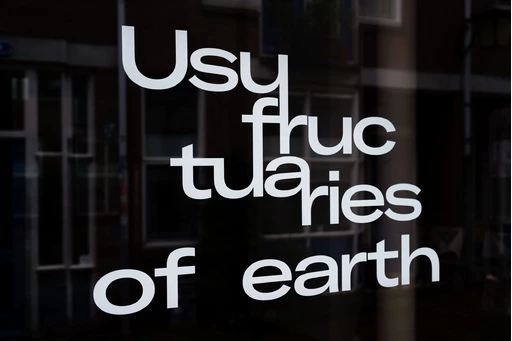
A slow-growing table of contents for the Usufructuaries of earth online reader. The reader emerges, to begin with, as a constellation of archival texts assembled here through the “Usufructuaries of earth” focus on Prospections. Throughout the duration of Usufructuaries of earth project and beyond, diverse content—long reads, interviews, conversations, and visual interventions—will incrementally be (re)published into a public research and learning curriculum that studies histories and propositions of usufruct, of renewing shared practices of usership of and with earth.
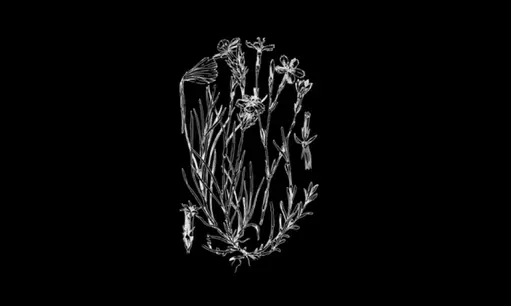
“We are in the siege of a nature that has been hurt, divided, defiled, poisoned, harmed, and made to bleed,” writes Pelşîn Tolhildan, member of the Kurdish Women’s Movement.
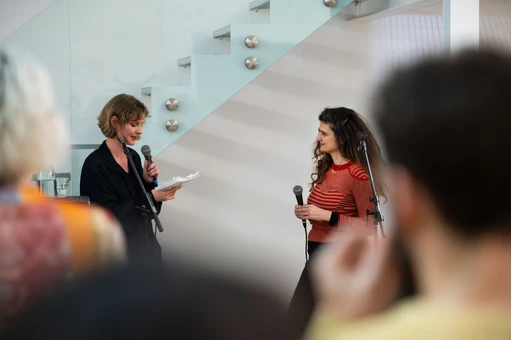
Usufructuaries of earth is the first comprehensive exhibition of Marwa Arsanios’s work in the Netherlands. The exhibition foregrounds the artist’s collaborative approach to bringing together ecological, feminist, and decolonial knowledges and practices that put forward ideologies of usufruct, unhinging property-relations from the idiom of individuated possession and toward forms of common, more-than-human userships. Here is an audio tour of the exhibition given by BAK convenor of research and publications Wietske Maas.
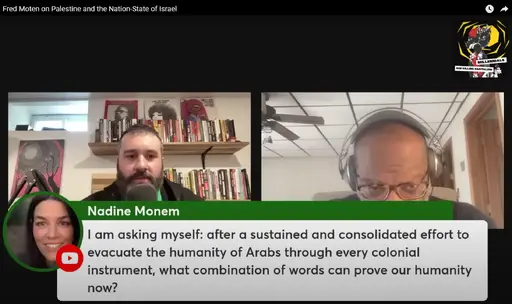
Jared Ware, host of Millennials Are Killing Capitalism (MAKC), conducted a conversation with cultural theorist, poet, and educator Fred Moten about Palestine, decolonization, settler colonialism, and the nation-state of Israel, streamed live on the MAKC YouTube channel 25 October 2023. We take the liberty to recirculate this in-depth reflection on the Palestinian predicament here on Prospections as part of the “To Read the War” focus.
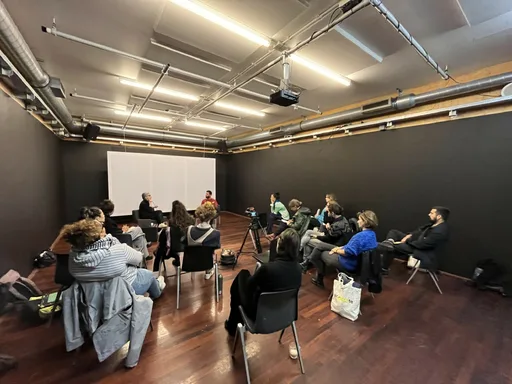
We at BAK, basis voor actuele kunst, Utrecht plea for an end to the violence in Palestine and call on artists, cultural and knowledge workers, practitioners in the fields of social action, and all our publics to stand up in solidarity with the struggles of all those who yearn for a world with no hierarchy of human worth.
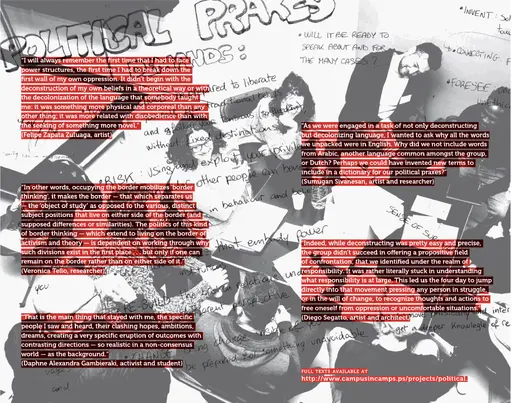
In April 2016, BAK, basis voor actuele kunst, brought to life the Here We Are Academy: a spirited temporary recomposition of a refugee-initiated platform for learning called We Are Here Academy.
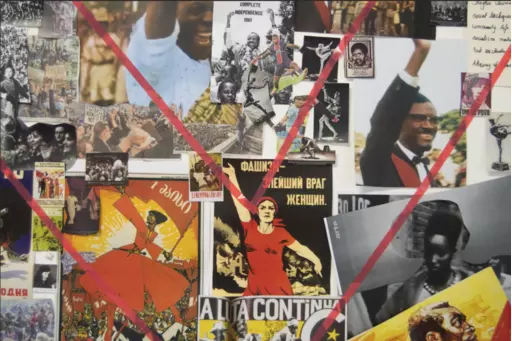
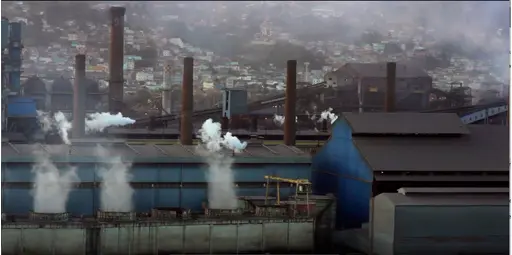
For more than two decades, anthropologist and filmmaker Massimiliano (Mao) Mollona has been doing ethnographic fieldwork on the dehumanizing forces of extractivism.
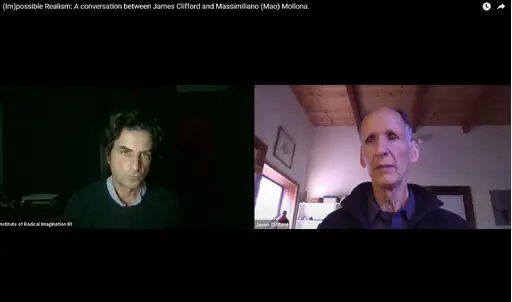
Anthropologist and educator James Clifford and anthropologist and filmmaker Massimiliano (Mao) Mollona have been sustaining a long-term conversation around the concept of “(im)possible realism”: a realism that accepts the contradictions of micro and macro scales, local and global, and thus the impossibility of telling a singular and unifying composite historical story.
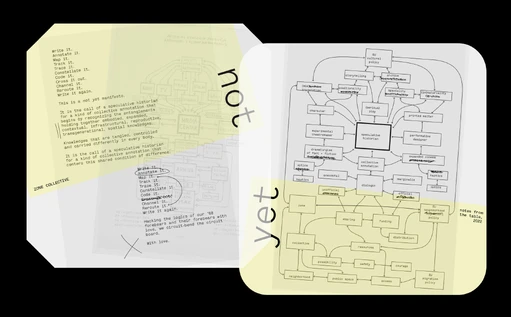
Notes from the Table. A Not-Yet Manifesto, 2022, digital rendering of an imagined expanded cinema installation, which is intended to include two overhead projectors, nine transparency sheets, and no less than three fine tip dry erase markers. Conceived and realized by Zone Collective together with their long-term design collaborator Karoline Świeżyński.
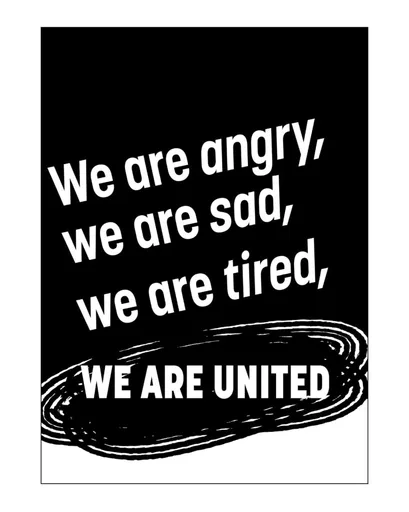
We at BAK, basis voor actuele kunst stand in full allyship and solidarity with ruangrupa, all artists and activists of documenta fifteen, and the broader lumbung ecosistem. The collective learnings of decolonial praxis that this edition of documenta have brought to Kassel have been an important and invaluable achievement. This labor reveals the urgency of addressing racist and imperial political agendas perpetuated in Germany today. To echo the words of writer and researcher Sami Khatib:

“Rhythm Travel” (1995) was published in Amiri Baraka’s short story collection, Tales of the Out & the Gone (Brooklyn: Akashic Books, 2007), republished here with kind permission of Akashic Books.
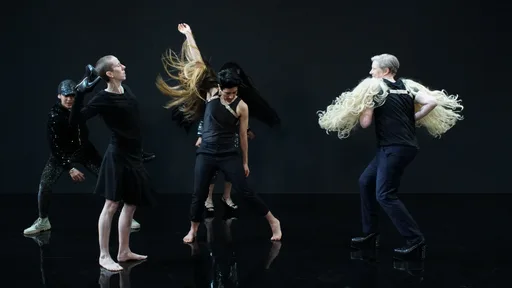
Temporal drag, erotohistoriography, chronomornativity, horniness under capitalism, rhythm, dancing, and crip time.
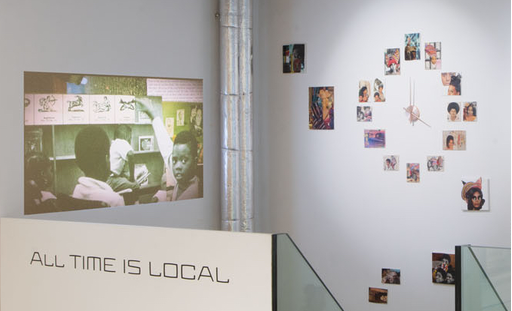
Black Quantum Futurism (Camae Ayewa and Rasheedah Phillips) in conversation with Jeanne van Heeswijk and Rachael Rakes.
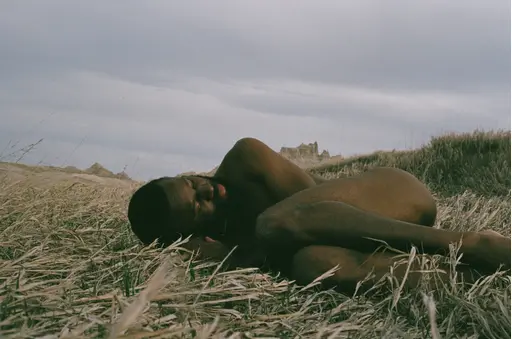
“The Clearing: Music, Dysfluency, Blackness, and Time” was originally published in Journal of Interdisciplinary Voice Studies, 5, no. 2, 2020, pp. 215–233 and is republished here in revised form with kind permission of the author.
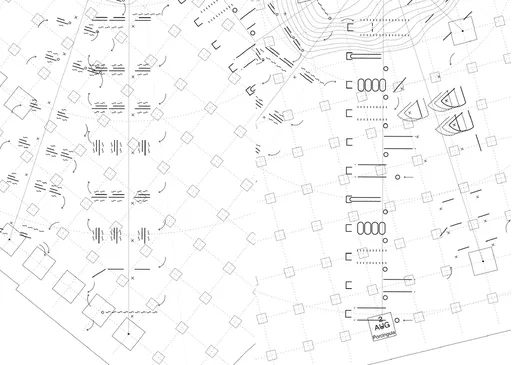
When Indigenous communities are asked to provide proof of their connection to ancestral lands, what Western legal forums accept as documentation does not truly represent or respect tribal culture and traditional formats of knowledge transfer.
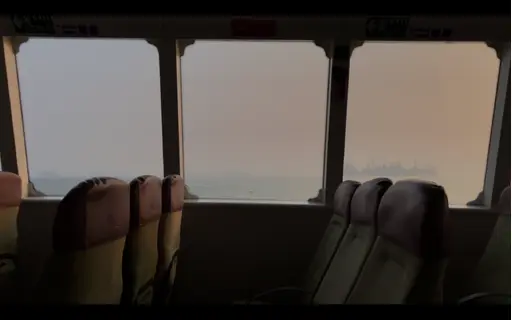
How do we reckon with our attachments to place, and their knotted historical relations? A meditation on maritime trade routes, SEA – SHIPPING – SUN (2021), is a short film directed by Tiffany Sia and Yuri Pattison shot over the span of 2 years to render a simulated duration of a day, from The film is set against a soundtrack of shipping forecasts from archival BBC Radio 4 broadcasts. The sun emerges and disappears, again and again.dawn until dusk.
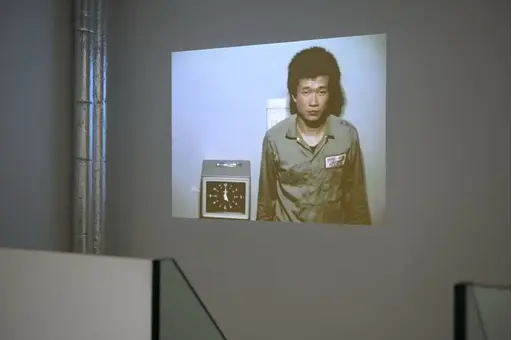
In this essay, Amelia Groom responds to Tehching Hsieh’s One Year Performance 1980–1981: Time Clock Piece (1980–1981), one of the works on view as part of the No Linear Fucking Time exhibition at BAK, basis voor actuele kunst, Utrecht. Through a reading of Dolly Parton’s contemporaneous antiwork anthem 9 to 5 (1980), Groom reflects on historical shifts in the ways that workers have been and continue to be exploited through techniques and technologies of time.
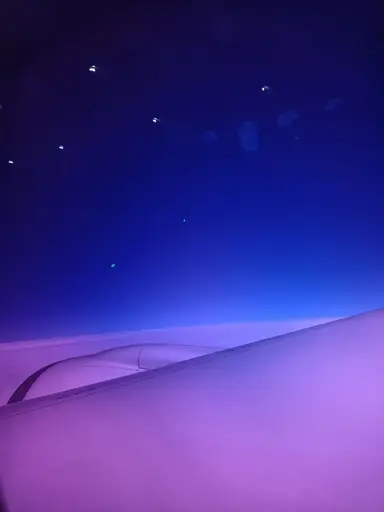
Grappling with the imposed linearity of timespace as a fundamental feature of colonial violence, this essay by Promona Sengupta (also known as Captian Pro of the interspecies intergalactic FLINTAQ+ crew of the Spaceship Beben) proposes a mode of time travel that is “untethered from colonial imaginations of the traversability of time and space.”
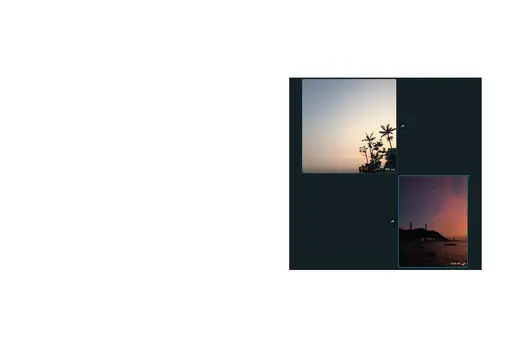
Weird Times (2021), is a 30-page chapbook by artists Tiffany Sia and Yuri Pattison on time-telling and hegemony. Featuring writing by Sia and images selected by Pattison, it is a brief history of the development of time-keeping technologies. The clock is disassembled as a political tool, a metronome of coercion and an accelerant of war power. Out of these mechanisms, resistant counter-tempos emerge.
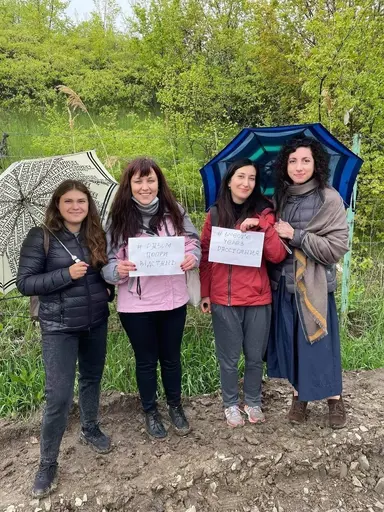
For Prospections “Standing With Ukraine. Standing With the Oppressed,” feminist, social researcher, and peace activist Nina Potarska has kindly given us permission to republish her 2016 text “Maidan and After: State of the Ukrainian Left.”
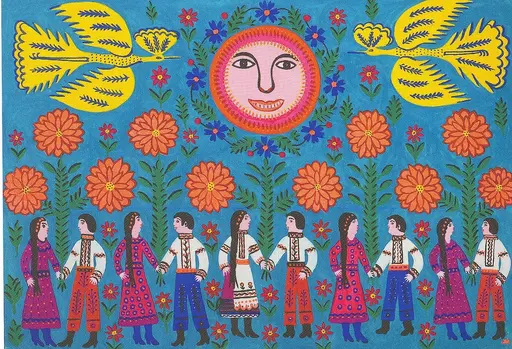
Oleksiy Radynski writes on the fifth day of war from a suburb of Kyiv for a case against the Russian Federation.
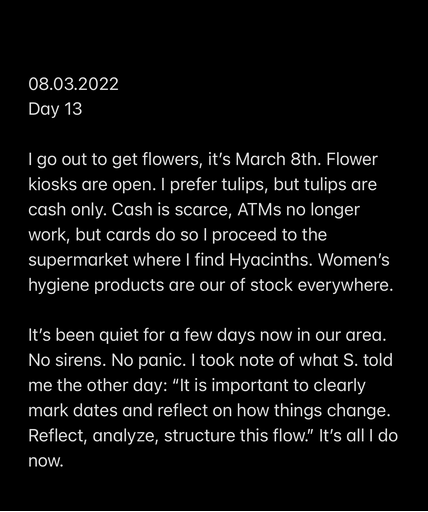
It is the thirteenth day of the Russian invasion of Ukraine. Researcher and art historian Asia Bazdyrieva remains in Ukraine, south of Kyiv with her family. She has shared a diary entry on Instagram for every day of the war so far. Here is her entry for Tuesday 8 March 2022—also International Women’s Day—republished above as images, and below as text-transcript with kind permission of the author.
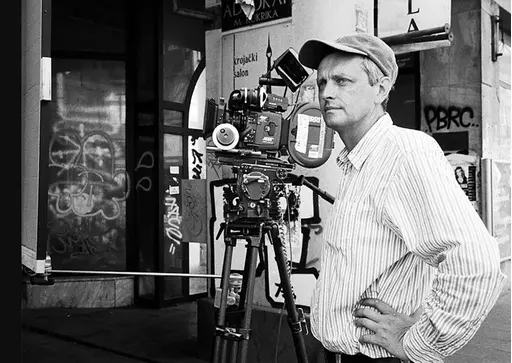
What follows is a makeshift reading (and listening) list of what we believe are relevant articles and interviews that give historic context on the invasion of Ukraine and how we at BAK—and a broader international left opposing this and all wars—can express solidarity and exert political pressure right now.

We at BAK, basis voor actuele kunst, Utrecht, condemn the brutal military invasion of Ukraine, launched by Vladimir Putin.
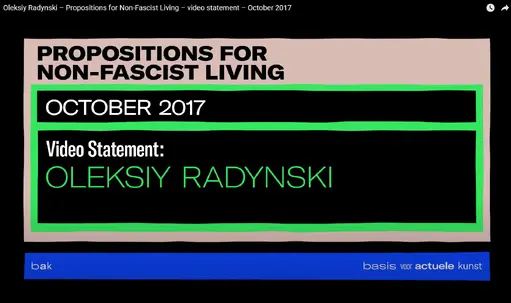
Within the long-term research itinerary Propositions for Non-Fascist Living (2017–2021), BAK asked artists, philosophers, scholars, and activists from multiple (political) geographies facing contemporary fascisms how they engage with the question of what constitutes non-fascist living.
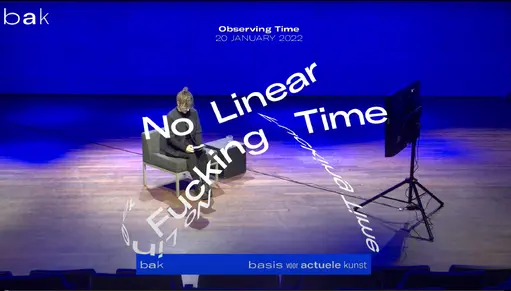
An online conversation with performance artist Tehching Hsieh, writer Amelia Groom, and writer and curator Adrian Heathfield, moderated by BAK curator of public practice Rachael Rakes on 20 January 2022. The conversation takes Hsieh’s work as a starting point in addressing performative time, labor time, gaps, and rhythms of endurance, among other things.
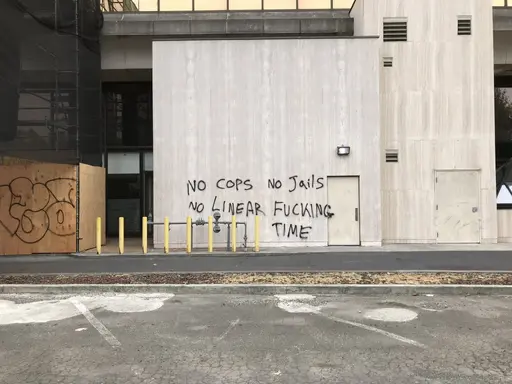
The “No Linear Fucking Time Bibliography” is an evolving resource which compiles selected scholarly and artistic texts relating to the various strands of study involved in this project.
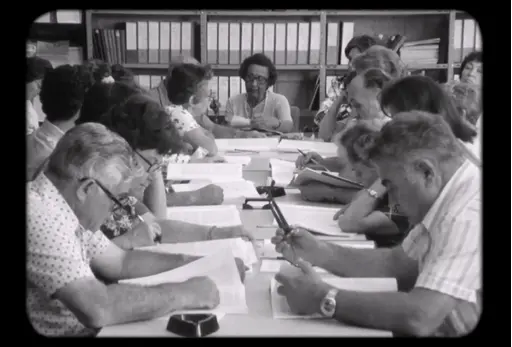
The modern nation-state is supposed to be ethnically and culturally homogenous; after World War II, both Israel’s implementation of Zionism and Arab Nationalism adopted versions of this purism—purging and excluding from the body social what refuses assimilation.
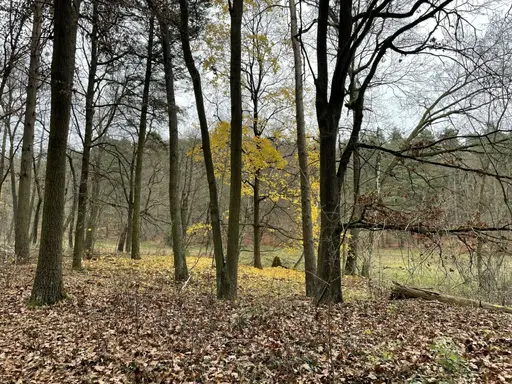
In “Reclaiming Time: On Blackness and Landscape” (first published in PN Review 257 in 2021), poet Jason Allen-Paisant traces the racialized social contexts and modern environmental constructs that “disproportionately rob Black lives of the benefits of time.”
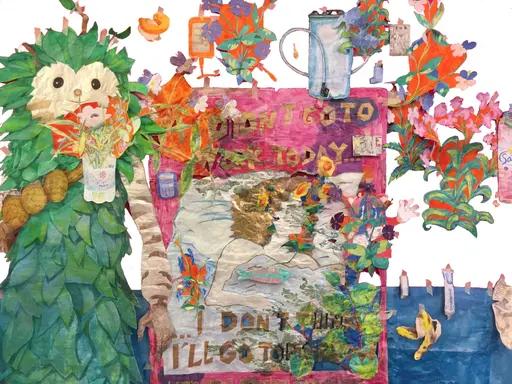
While walking through the “Nothing To Declare” arrivals gate at London Stansted Airport, Sam Keogh is confronted by three border guards: a pig, a unicorn, and a worried cartoon clock.
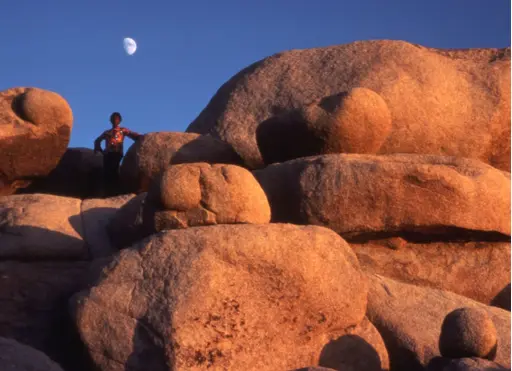
In this conversation with Walidah Imarisha (first published in Toward the Not Yet: Art as Public Practice, published by BAK and MIT Press, 2021), the writer and activist outlines her concept of “visionary fiction” as an imaginative practice to emancipate futures from the stronghold of linear time.
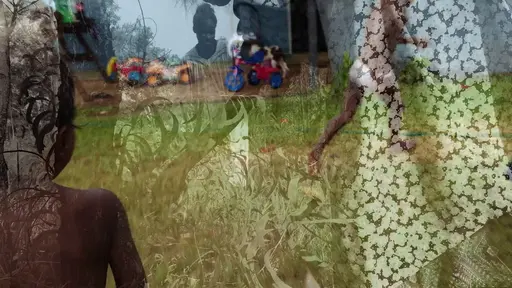
Drawing from her work as part of the Karrabing Film Collective, Elizabeth A. Povinelli’s essay “In Some Places the Not-Yet Has Long Been Already” (which first appeared in Toward the Not Yet: Art as Public Practice, published by BAK and MIT Press, 2021) contrasts the temporal orientation of late settler liberalism—which is troubled by the coming catastrophes of climate collapse—with the ancestral catastrophes of coloniality and enslavement, which are both past and present.
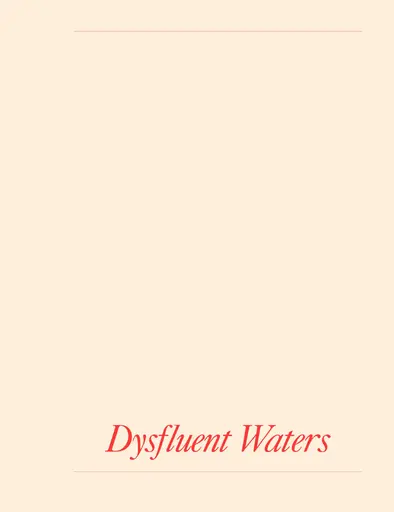
Designed by Rissa Hochberger, with additional design by JJJJJerome Ellis and Kelvin Ellis, the book The Clearing is the eighth title in Wendy’s Subway’s Document Series, an interdisciplinary publishing initiative highlighting the work of time-based artists in printed form.
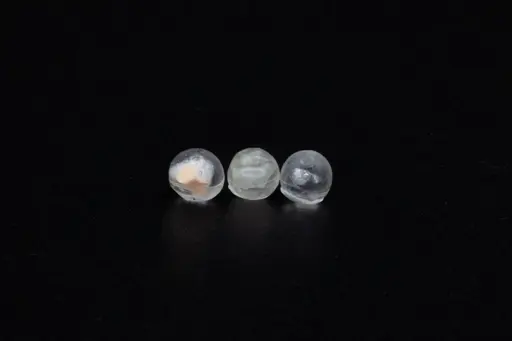
In her text “Dearest Zen (Letters to Lichen),” artist and scientist Adriana Knouf presents future love letters written to lichens, symbiotic organisms of fungi and algae or cyanobacteria.
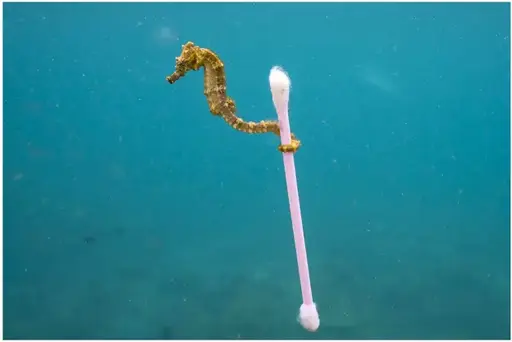
In “Immortals: On the Ancient Future Lives of Stone and Plastic,” Marianne Shaneen blends stories, histories, and ontologies of two substances: stone and plastic.
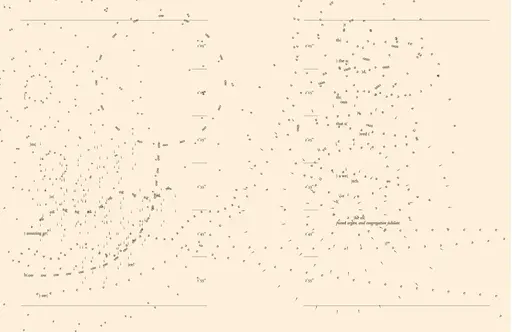
“The Clearing: Melismatic Palimpsest” is a part of musician and writer JJJJJerome Ellis’s multi-faceted project The Clearing (book published by Wendy’s Subway and album of the same name released by NNA Tapes, 2021). Conceiving of the forest and its clearings as “sites of resistant black oralities for centuries,” Ellis explores how stuttering, blackness, and music can figure within practices of refusal against the hegemonic governance of time, speech, and encounter.
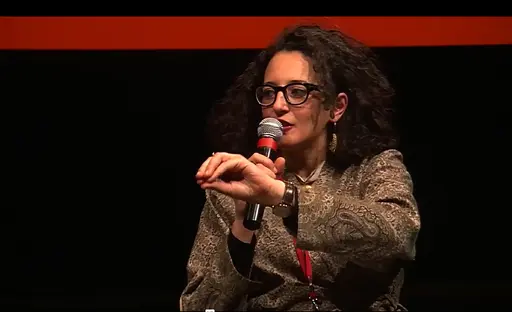
As part of FORMER WEST: Documents, Constellations, Prospects, 18–24 March 2013 at Haus der Kulturen der Welt, Berlin, art critic, poet, and curator Ranjit Hoskote convened a forum on “Insurgent Cosmpolitanism” with cultural theorists and artists whose work addresses and performs the insurgent cosmopolitan condition.
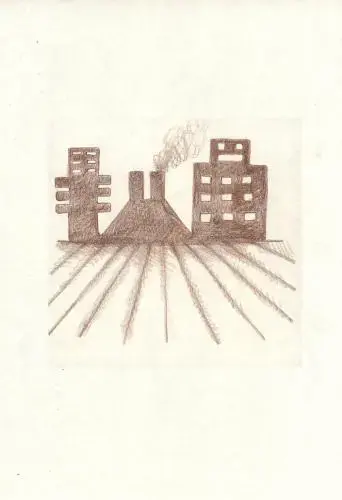
Mariana Botey’s text The State Is Coagulated Blood and Bones is written as a prologue to Cooperativa Cráter Invertido’s codex-comic Sangre Coagulada y Huesos (Coagulated Blood and Bones, 2021). The two contributions have been conceived in collaboration and are to be read in parallel, allowing for a mutual disruption of discourse and image.
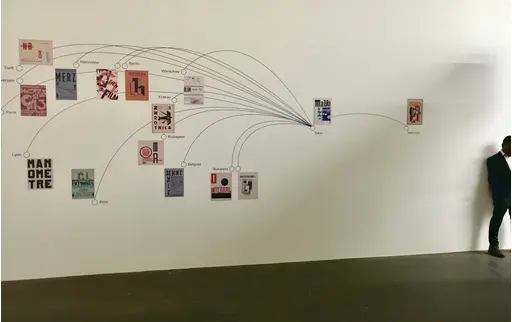
Long weaponized in the service of capital by the agents of neoliberalism, the nation-state is once again upheld as the bulwark of a white ethnos, securing privilege against migrants and immigrants, and against other nation-states in relations of neocolonial dependence.
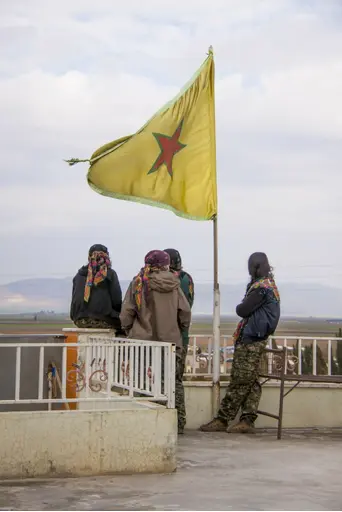
From: New World Academy Reader #5: Stateless Democracy, Renée In der Maur and Jonas Staal in dialogue with Dilar Dirik, eds. (Utrecht: BAK basis voor actuele kunst, 2015), pp. 27–54
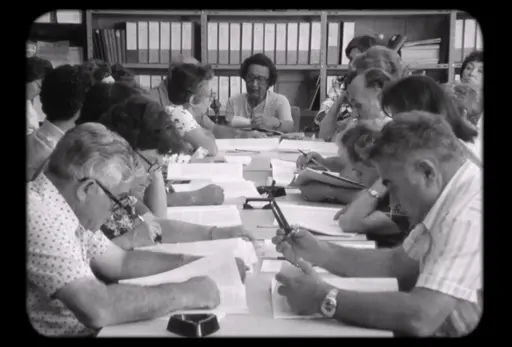
From: Once We Were Artists, Maria Hlavajova and Tom Holert, eds. (Utrecht: BAK, basis voor actuele kunst and Amsterdam: Valiz, 2017), pp. 32–52
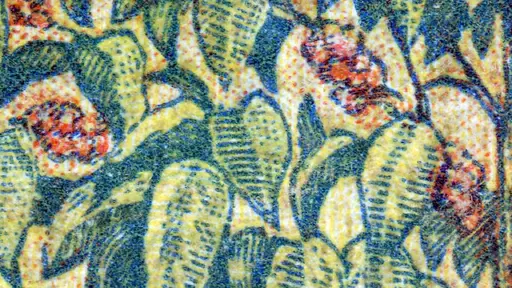
In 1970–1971, Guyanese radical historian and anti-colonial activist Walter Rodney gave a series of lectures on the historiography of the Russian Revolution at University of Dar es Salaam, Tanzania. Inspired by C. L. R. James’s historical work on the October Revolution, Rodney set out to reveal the parallels between the problems confronting the postcolonial regimes in Ghana and Tanzania, and those that the Bolsheviks faced in building the Soviet state.
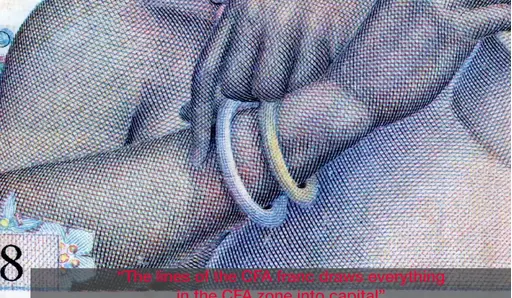
The video The Cut, The Punch, The Press (2021) is assembled from filmed fragments of a collection of 65 banknotes of the CFA franc, circulated between 1945–2021.
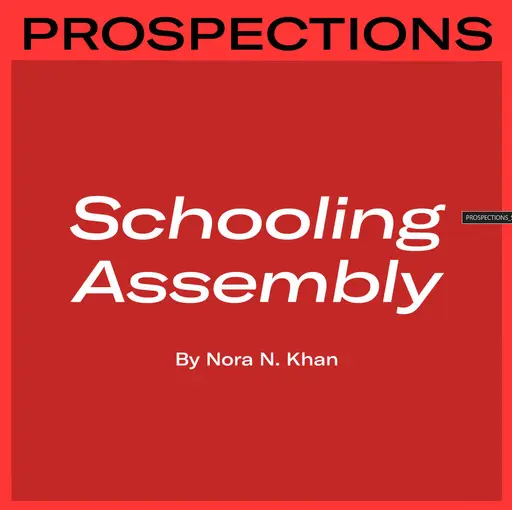
“Schooling Assembly” by Nora N. Khan traverses a year of pandemic teaching, in which faculty and students have witnessed widening cracks in the university system and its human opportunity cost calculations, and have faced new challenges in asserting creative and collective autonomies.

BAK, basis voor actuele kunst, Utrecht stands in solidarity with the Palestinian decolonization struggle and with decolonization efforts everywhere.
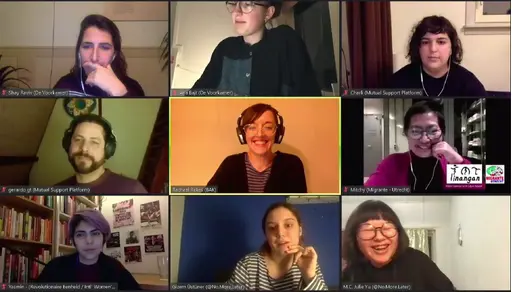
This locally-focused second edition of Practicing Tactical Solidarities: A Roundtable on Mutual Aid, Emergency, and Continuous Care took place on 16 December 2020. It featured artists, organizers, and activists working in Utrecht, many of whom were at that time BAK Fellows.
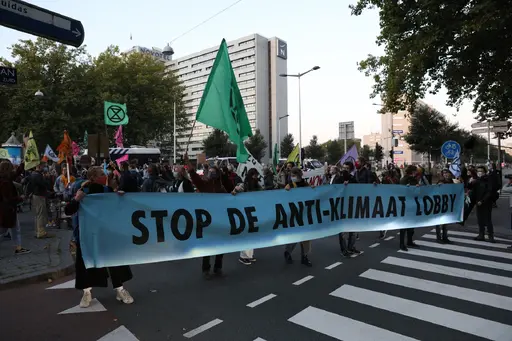
Extinction Rebellion (XR) entered the spotlight in late 2018 with a call for mass disruptions, followed by a first wave of actions which saw thousands come together to block major bridges in London.
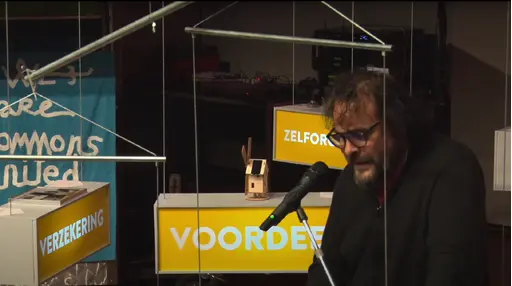
La Colonie opened its doors on rue La Fayette, Paris on 17 October 2016 as a radically open space of discussion and exchange for diverse cultural and political communities.
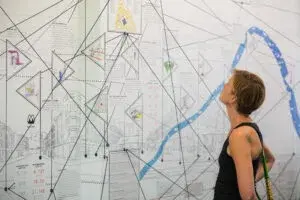
This diagram by artist Jeanne van Heeswijk depicts the story of Freehouse Radicalizing the Local, a project focusing on the struggle for the right to live well in the Afrikaanderwijk neighborhood of Rotterdam.
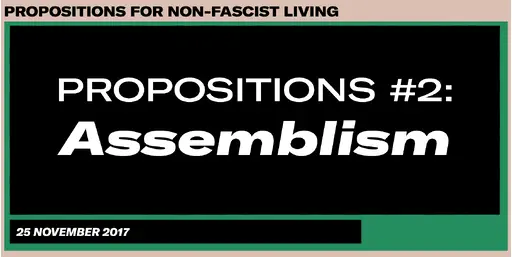
The gathering Third Assembly: After the Assembly took place as part of the daylong program Propositions #2: Assemblism, convened by BAK and artist Jonas Staal on 27 November 2017.
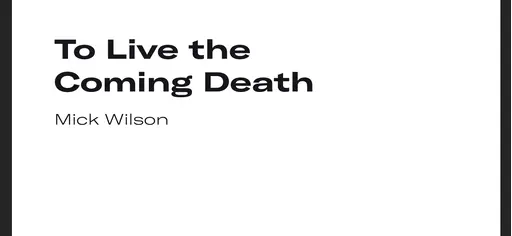
From: Propositions for Non-Fascist Living: Tentative and Urgent, Maria Hlavajova and Wietske Maas, eds. (Utrecht: BAK, basis voor actuele kunst and Cambridge, MA: MIT Press, 2019), pp. 165-179
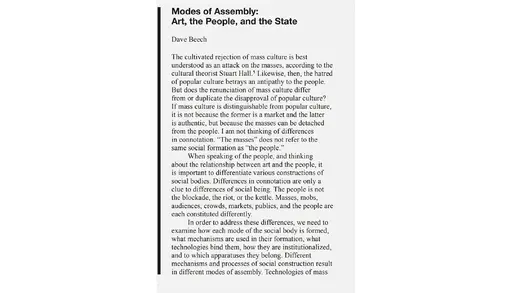
From: FORMER WEST: Art and the Contemporary After 1989, Maria Hlavajova and Simon Sheikh, eds. (Utrecht: BAK, basis voor actuele kunst and Cambridge, MA: MIT Press, 2016), pp. 559-569
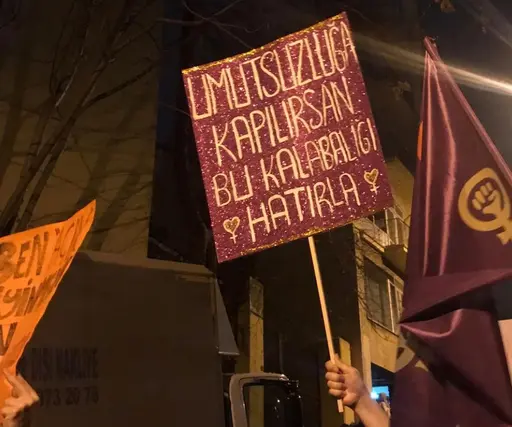
"We were in the streets for the Feminist Night March on 8 March, exactly three days before the first Covid-19 case was officially declared in Turkey..." Read the translation of an essay originally published in Turkish on 1+1 Forum, 30.04.2020.
For this first session of "In Proximity," an ongoing series featured on Prospections, BAK’s Curator of Public Practice Rachael Rakes enters into a conversation with artist and BAK 2017/2018 Fellow Wendelien van Oldenborgh.
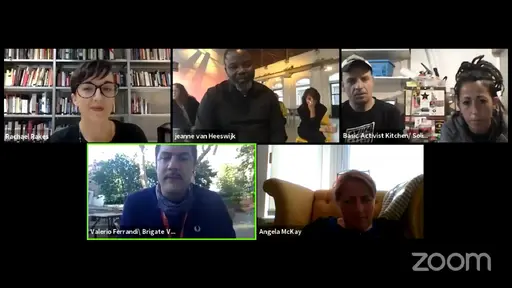
A videorecording of the online event Practicing Tactical Solidarities: A Roundtable on Mutual Aid, Emergency, and Continuous Care, livestreamed via Prospections on Wednesday 29 April 2020, 19–21 hrs.
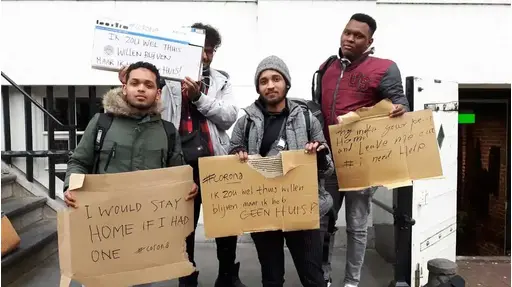
Interviewed and introduced by Irene Calabuch Mirón and Sanne Karssenberg (BAK, basis voor actuele kunst).
From: Trainings for the Not-Yet, an exhibition as a series of trainings for a future of being together otherwise, convened with a multitude of collaborators by Jeanne van Heeswijk and BAK, basis voor actuele kunst, Utrecht (2019–2020)
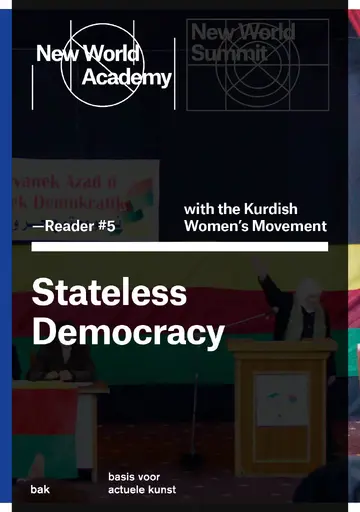
From: New World Academy, an alternative learning platform for art and politics established by Jonas Staal and BAK, basis voor actuele kunst (2013–2016).
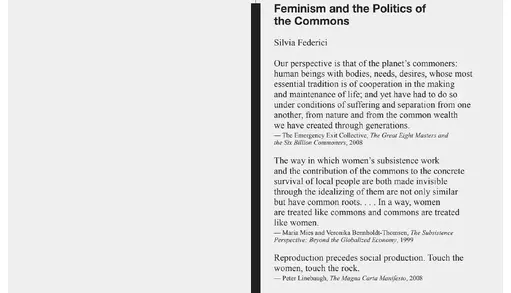
From FORMER WEST: Art and the Contemporary After 1989, Maria Hlavajova and Simon Sheikh, eds. (Utrecht: BAK, basis voor actuele kunst and Cambridge, MA: MIT Press, 2016), pp. 379-390.
“To Read the War” is an assemblage of texts, visual essays, interviews, conversations, and even entire publications from BAK, basis voor actuele kunst’s archive[1] and beyond, republished here on BAK’s digital forum, Prospections. Hurtled into being in these devastating days of escalating violence in Palestine, it coincides with BAK’s long-term series To Watch the War, In Solidarity and the moving image forum To Watch the War: The Moving Image Amidst the Invasion of Ukraine (2014–2023).
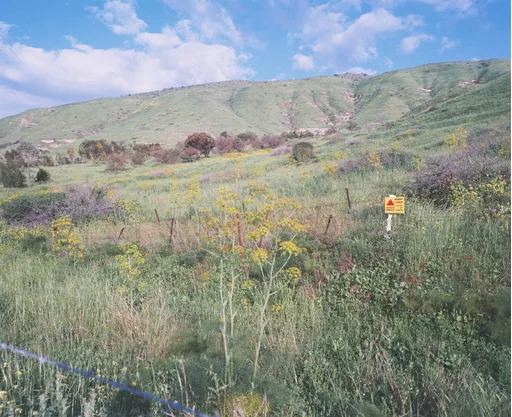
“Scarecrows” is a visual essay by artist Jumana Manna. Here, Manna images daily acts of defiance by Palestinians foraging wild plants for food and medicine; something their survival had depended on for centuries. These humble resistances take place in the face of the legal prohibitions imposed by the State of Israel. The thinly veiled imperialist and racist laws, disguised as preservation decrees protecting plants and other species, are aimed, de facto, against the very possibility of people sustaining their lives on their own lands. “Lands that, in many cases,” Manna stresses, “have been expropriated by the Israeli state and are administered as Israeli settlements, nature reserves, military training areas, and other forms of ‘state land.’” The state here, indeed, continues usurping the power to decide “what is made extinct and what gets to live on; about who gets to decide the fate of these foraging traditions and the options that remain for those who don‘t.”
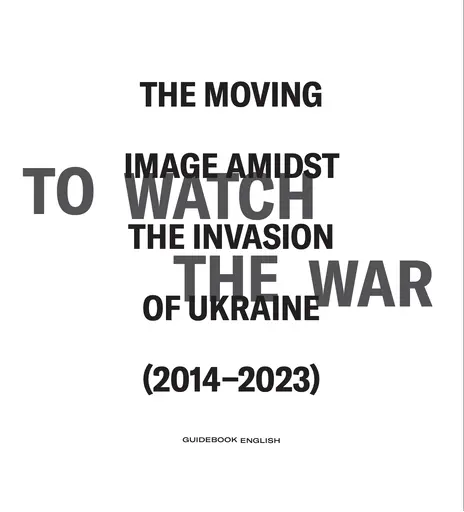
To Watch the War: The Moving Image Amidst the Invasion of Ukraine (2014–2023) Guidebook English , is the guidebook to the moving image forum To Watch the War: The Moving Image Amidst the Invasion of Ukraine (2014–2023), exhibited at BAK, basis voor actuele kunst, Utrecht 9 September–29 October 2023.
